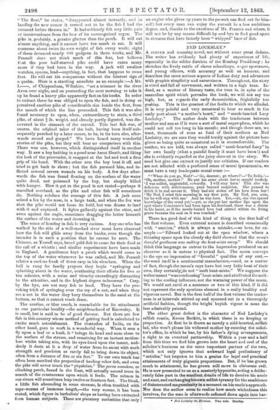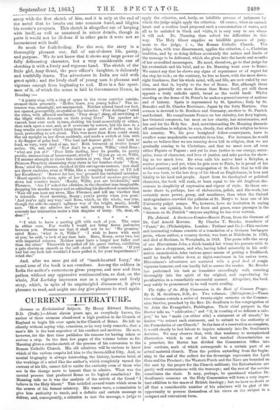NED LOCKSLEY.*
A CLEVER and amusing novel, not without some great defects. The writer has evidently had plenty of experience of life,
especially in the wilder districts of the Bombay Presidency ; he sketches the lively rattle of clever schoolboys, eager sportsmen, and young officers, with accuracy as well as humour, and describes the more serious aspects of Indian duty and adventure with graphic simplicky and earnestness. Throughout, the story is vivid and full of movement, and written in a high tone. In- deed, as a matter of literary taste, the tone is, in spite of the
masculine spirit which pervades the book, we will not say too high, but, as regards the early domesticities, frightfully too gushing. This is the greatest of the faults to which we alluded.
It is very painful and very unnatural to hear so much in the early part about "a mother's heart," and "meek-hearted Lucy Locksley." The author deals with the tenderness between mother and son as if it were a sort of moral sugar-plum, which he could not roll too long in his mouth; and though there are, we trust, thousands of sons as fond of their mothers as Ned Locksley, we are sure they would testify against the picture here given as being quite as unnatural as it is uncomfortable. The mother, we are told, was always called " meek-hearted Lucy" in her own family (what a painful family it must have been !) and she is evidently regarded as the juicy element in the story. We need but give one extract to justify our criticism. If our readers are not affected with a profound sense of moral ipecacuanha, we must have a very inadequate moral sense :—
"When do you go, Ned?'—' Go, dearest ; go where To Tnrlia.'— ' Oh, mother, mother !' He put his arms about her so manful tende* was selfish, ungrateful, cowardly. I will stay bare.' This also was delicious with deliciousness, pure beyond suspicion. She paused to drink it in and savour it. They had not stolen all his love from her ! My Ned, I cried this morning in my first pain. My Ned, yes, mine, for he will stay with me.' And he was hers. Yet,—ala, she was spared knowledge of the cruel yet !—yet, as she put her mother lips upon the spot where Constance's had been upon his forehead, there was a shiver in his heart, as if the newly-buried love had stirred within its living grave because the seal on it was touched."
There is a good deal of this kind• of thing in the first half or the first volume. Even external nature is described occasionally with " unction," which is always a mistake,—as here, for ex- ample :—" Edward looked out at the open window, where a thinning space upon the cloudy sky-field showed that the noon's forceful gentleness was melting the heat-mists away." We should think this language as untrue to the impression produced on an observer as it is untrue to physical fact. The moon conveys to the eye no impression of " forceful " qualities of any sort,— the word itself is a sentimental manufacture,—and, as a matter of fact, though the moon's rays have but very little heat of their
own, they certainly:do not "melt heat-mists." We suppose the writer meant "was condensing" heat-mists, and attributed the melt- ing to the cooling influence, not the warming power of the moon.
We would not cavil at a sentence or two of this kind, if it did not represent the only spurious element in a really healthy and vigorous novel. But in the first half of the first volume the tender- ness is at intervals stirred up and spooned out in a thoroughly artificial fashion, though the bright boyish vigour is none the less admirably painted.
The other great defect is the character of Ned Locksley's selfish cousin, Keane Burkitt, in which there is no keeping or proportion. At first he is drawn as merely a cold-hearted, selfish lad, who won't please his widowed mother by entering the solici- tor's office, in which he has, by his father's dying arrangements, a right to an eventual partnership. Within a year and a half from this time we find him grown into the heart and soul of the solicitor's business as the more important partner of the two, which not only ignores that awkward legal preliminary of "articles," but imputes to bins a genius for legal and practical
attainments of truly gigantic proportions. But, if lie has grown much in attainment, he has grown still more in elaborate evil. He is now presented to us as a masterly hypocrite, acting a delibe- rately false part in the smallest details of life to deceive his uncle and aunt, and exchanging hisown selfish tyranny for the semblance
of disinterested magnanimity in a moment on his uncle's approach.
Nor does the author seem to realize how much wickedness this involves, for the man is afterwards softened down again into liar-
Ned Locheley the Etonian. Two vols. Bentley.
mony with the first sketch of him, and it is only at the end of the novel that he breaks out into common fraud, and blights his cousin's prospects. This sketch is altogether out of keeping with itself, as well as unnatural in minor details, though in parts it would not be ill-done if in other puts it were not so inconsistent with itself.
So much for fault-finding. For the rest, the story is a thoroughly pleasant one, full of out-of-doors life, gaiety, and purpose. We do not know that it shows any large power of fully delineating character, but a very considerable one of sketching it with a lively and vigorous hand. The sketch of the little girl, Amy Grant, the poor officer's daughter, is delicately and truthfully drawn. The adventures in India are told with great spirit ; and the lively chaff of young men is pleasant and vigorous enough from beginning to end. Here is a fair speci- men of it, of which the scene is laid in Government House, in Bombay :— " A jaunty step, with a ring of spurs in the stone corridor outside, aroused them presently. Holloa there, you young ladies !' The in- trusion was, seemingly, not unexpected. Neither stirred hand nor foot, nor opened, perceptibly, an eyelid on the intruder. Poor darlings !' cried the voice, with affected sentiment. They Bleep! sleep, all unwitting of the blight which descends on their young lives!' The speaker ad- vanced, bent over each in turn, shaking his head mournfully at either, then sank upon a seat, and, as if overcome by sorrow, hid his face in a king muslin streamer which hung from a queer sort of turban on his head, pretending to sob aloud. This was more than Rosa could stand. She sat upright on her divan suddenly, and made a switch at him with a fly-flapper of palm leaf. 'The best and dearest girls! And both so fond, so very, very fond of me, too ! Both bereaved at twelve hours' notice. Oh, sad, sad!' ' Now don't be a goose, Willie,' cried Rosa ; what are you at?' ' Poor little darling, hear its prattle, its pretty prattle, unconscious of bereavement, utterly!' ' If you go on so, Willie, I'll muster strength to throw this cushion at you, that I will, spite of Princess Propriety shamming sleep there in her bamboo chair.' 'Now, Rosa,' cried the princess, shocked at this outrageous menace, you shall not throw cushions, even at Willie, like a romping tomboy, or I'll tell her Excellency.' 'Sorrow for her, too,' groaned the turbaned intruder. Heart agonies in store, spite of her little hoard of maxims preaching down her cousin's heart."Really, Willie, you are intolerable,' said Florence. Am I?' asked the offender, in the cheeriest tone imaginable, dropping his muslin weeper and re-adjusting his disordered mustachioes. Wait till you bear my news, Miss Florence, and tell me whether that is tolerable. Good morning, Rosey ; you're pretty -when you pout.' And you're ugly any way,' said Rosa, which, on the whole, was true, though the aide-de-camp's ugliness was of the bright, manly, kindly
sort. How she admires me !' he said, turning to Florence, and conceals her infatuation under a thin disguise of irony. Oh, dear, oh, " wish to leave a parting gift with each of you. The same in either case. For worlds I would not bring fierce jealousies between you. Promise me that it shall not be so.' 'We promise,' cried Rosa ; what is it, Willie?' ' I wish to leave with each of you,' he said, a lock of my dear hair. Here, nosey, sever two, but with impartial scissors. Neither must have a longer nor fuller curl than the other.' Therewith he pulled off his queer turban, exhibiting a pate shaven as smooth as the soft cheek of either cousin. 'If you had but one lock left wouldn't I have pulled it, for your impertinence !' cried she."
And, after we once get rid of "ineek-hearted Lucy," the moral tone of the book is not overdone. Among the soldiers in India the author's earnestness gives purpose, and now and then pathos, without any oppressive sentimentalism, so that, on the whole, Ned Locksley impresses one as a vigorous and lively story, which, in spite of its unprincipled dgnouement, it gives pleasure to read, and might one day give pleasure to read again.



































 Previous page
Previous page